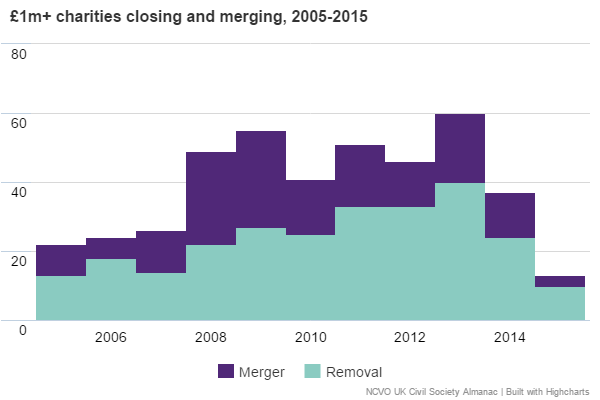Philanthropists and Funders: Why spending out and closing down needn’t mean fading away
 Foundations, charities and trusts close. This is a reality for charitable organisations and philanthropists who’ve met their goals, merged or decided to spend out their funds for any number of reasons.
Foundations, charities and trusts close. This is a reality for charitable organisations and philanthropists who’ve met their goals, merged or decided to spend out their funds for any number of reasons.
Take the Northern Rock Foundation. An independent grantmaking charity, it aimed to improve quality of life in the North East of England and Cumbria. And it did, awarding £225 million in 4,400 grants between 1998 and 2014. In it’s last year, the foundation awarded £10.3 million in the form of six large awards to improve the lives of children and young people and to support voluntary organisations.
On 25th April 2016, the foundation closed.

Source: NCVO, Charity Commission
Like any number of large charities closing or merging, the Northern Rock Foundation had a dilemma: How could they keep the history of the good they’d done alive even after they were gone? They looked at preserving their history through their website (the story of Northern Rock Foundation) and donating their reports to the Tyne and Wear archives, keeping the information in the public domain.
Around that time, Fran Perrin of Indigo Trust was championing a way to use data about grantmaking to support decision-making and learning across the charitable giving sector. This lead to the establishment of 360Giving. The Northern Rock Foundation decided that publishing their grantmaking data to the 360Giving Standard would not just preserve their legacy, but it would keep the information alive and useful for charities, policy makers, researchers and anyone interested in charitable giving in the UK.
So, if your organisation is winding up, what do you need to consider if you want to preserve the organisation’s funding legacy? Here are three things to think about:
1. A commitment to preservation and transparency in your organisation.
360Giving may be about grantmaking data, but all projects involve and affect people, so buy-in is key to ensure your preservation project is supported and completed before winding up.
2. A good knowledge of your grantmaking data.
As your organisation is winding up, you won’t be available to answer questions about your funding. We recommend you publish good data that is useful to the charitable sector because it is usable, which means it will be used. The 360Giving team can work with you to explore what it means to publish to the 360Giving Standard and how to get there from where you are now. This means your legacy of funding will be accurate (as you control how it is presented) and can tell your story about your organisation’s funding.
3. A commitment to openness.
All data published to the 360Giving Standard is open data. That means before you wind up, you agree on an open data license. The license tells anyone wanting to use your data that 1) it is reusable, and 2) if they need to credit your organisation (or not) wherever it’s used.
360Giving primarily focuses on UK grantmaking, but any organisation can publish its grants data to the 360Giving Standard and anyone can access and use the data internationally – all they need is access to the internet. So you can get in touch with our support team no matter where in the world you are to get the ball rolling. We don’t charge a fee as all our support is funded through grants that we receive.
Perhaps you’d like to see some examples of how we preserved Northern Rock Foundation’s legacy in data? You can download the Northern Rock Foundation grantmaking file, view the Northern Rock Foundation license page or the Northern Rock Foundation publisher page on GrantNav.
Curious about the Standard? Take a look at these frequently asked questions.
Spending out and closing down happens, fading away doesn’t have to.
